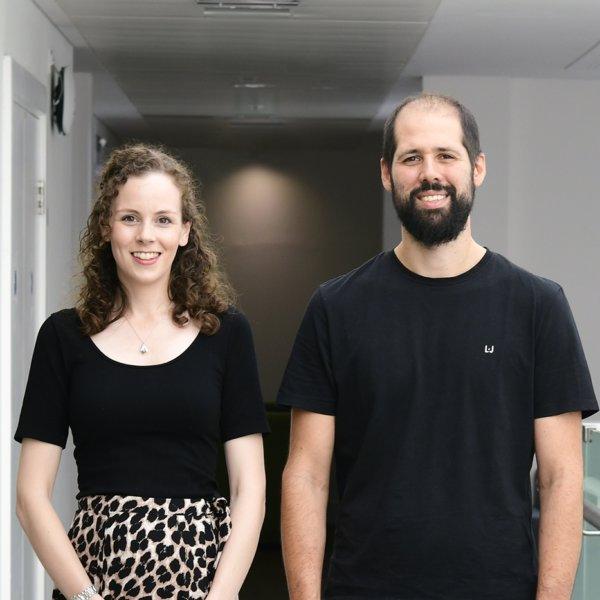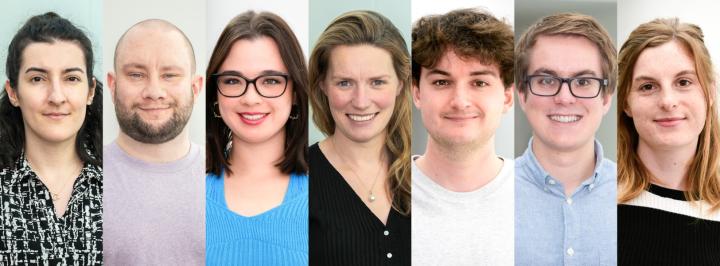2023 Hastie Career Advancement Fund and Early Career Awards winners announced
Congratulations to Joanne Simpson and Simone Pelliciari, who were awarded grants from the Hastie Career Advancement Fund, and the 7 other IGC researchers who received Early Career Awards.

Dr Joanne Simpson and Dr Simone Pelliciari have been awarded grants from the Grants Hastie Career Advancement Fund for their projects entitled ‘PLD3 as a double-edged sword in glioblastoma development and Alzheimer’s disease’ and ‘Role of MCMBP in MCM2-7 replicative helicase maturation’ respectively.
The Hastie Career Advancement Fund was launched in 2018 to honour the legacy of Emeritus Professor Nick Hastie and supports talented early-career scientists at the Institute of Genetics and Cancer to progress in their careers and transition to independence.
As former Director of the Institute and the MRC Human Genetics Unit, Professor Hastie played an active and inspirational role in the careers of hundreds of research scientists and continues to do so through the Fund. In addition to funding, awardees also get the opportunity to present their work to Professor Hastie and receive his guidance, career advice and support.
Dr Joanne Simpson, of the Gammoh Research Group, is one of this year’s Hastie Career Advancement Fund Awards recipients. Dr Simpson is investigating the role of autophagy in the development of the highly aggressive brain tumour, glioblastoma, to help understand the inverse relationship between neurodegeneration, which is associated with reduced autophagy levels, and cancer development.
The second recipient of this prestigious funding is Dr Simone Pelliciari of the Deegan Research Group. Dr Pelliciari’s research topic is focused on the study of DNA replication termination in humans using a reconstituted replication system generated via purified proteins. This tool allows investigation into how replication termination happens in humans and which factors are required for its resolution. This is important as failure to properly resolve replication termination leads to genome instability, mutation accumulation and cell death.
I am honoured to receive the Hastie Career Advancement Fund to work on new ideas. I will use the fund to investigate if PLD3, a phospholipase required for autophagy, can impact brain tumour progression. The findings generated from this award will contribute to further funding applications that will be invaluable for my development towards independence.
The Hastie Career Advancement Fund Award is a fantastic opportunity because I will be able to complement our biochemical assay with cutting edge Cryo-EM approaches, thus allowing me to visualize key intermediate in the replication process which will reveal specific pivotal interaction among the proteins involved in the process.”
Also announced were the winners of the Institute of Genetics and Cancer Early Career Awards. This programme was created to give researchers the opportunity to develop new ideas, novel training and to provide experience and practice in applying for research funding. Applications were reviewed by a panel drawn from across the IGC, and assessed for importance of the research question, imagination of the proposal, potential for career development and facilitating additional research funding acquisition, translational potential and feasibility.
Dr Jack Brydon, KTP associate in the Ball Research Group, received an Early Career Translational Award for his project entitled ‘Development of IFNα subtype discriminating antibodies’.
In addition six IGC researchers received with Early Career General Awards, these are:
- Silvia Shen (Brown Research Group, also supervised by Dr Sara Knott, IEE, and Dr Pau Navarro, Roslin Institute) - Leveraging a novel theoretical framework to discover druggable genes contributing to Atopic Dermatitis.
- Dr Nicholas Younger (Long Research Group) - Understanding the temporal dependency and handover of enhancers at cell-type transition points during craniofacial development.
- Fraser McPhie (Mill Research Group) - Development of live-cell SMLM imaging techniques for monitoring endogenous protein dynamics ex-vivo.
- Emily Southworth (Herrington and Gourley Research Groups) - Plenary oral presentation of PhD research at Liverpool Pathology 2023.
- Melek Suluova (Ball Research Group) - Interaction between Hippo Pathway Elements and the E3-ligase CHIP regulates a potential marker of Alzheimer`s disease .
- Morven Allan – (Colorectal Cancer Genetics Group - Dunlop and Professor Farrington Research Groups) - Exploring the mechanism by which variation at the FUT2 gene imparts elevated risk of colorectal cancer: the causal relationship of the gut microbiome .



